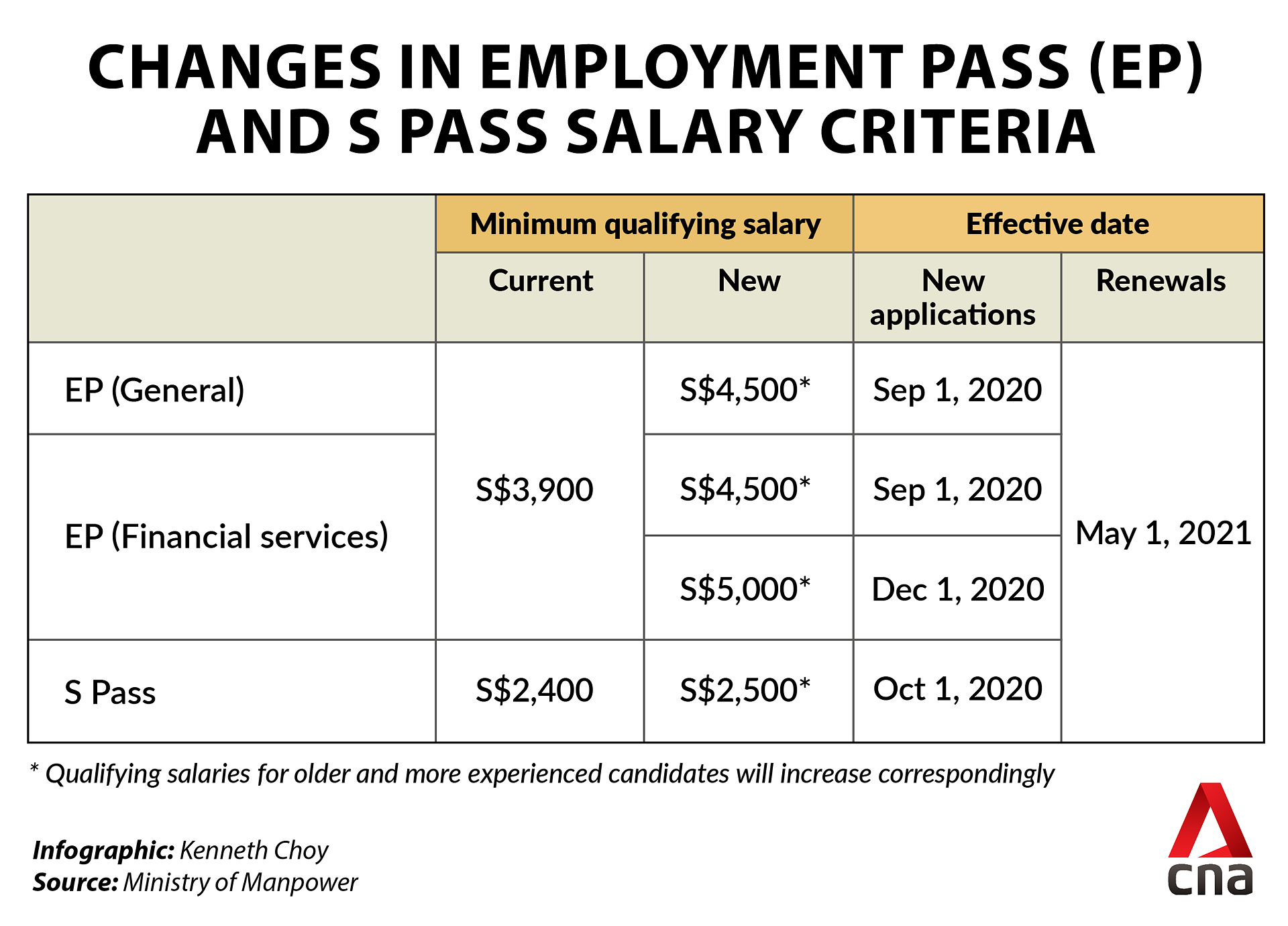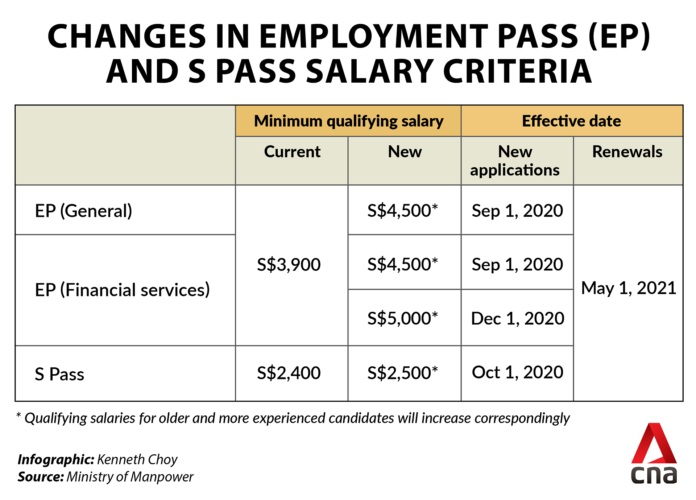SINGAPORE: Adjusting the Employment Pass and S Pass criteria to complement the measures available for businesses to expand and retain local employment is timely amid the COVID-19 economic fallout, said Minister for Manpower Josephine Teo on Thursday (Aug 27).
Speaking to reporters in a virtual press conference, Mrs Teo noted that the criteria for approving work passes are regularly updated, depending on the “prevailing conditions of the economy at the time”.
“The key shift is that we now see in the job market more slack. And the more slack is really a result of people having been put out of work because their companies have decided that it’s not possible for them to be retained,” sad the minister.
She also noted that there are people looking for alternative work as their working hours have been reduced.
“Yes, we have reopened the economy, but we also must recognise that the resumption of activities is quite uneven,” Mrs Teo said, adding that some sectors are experiencing manpower shortages compared to others.
READ: Minimum qualifying salary to rise by S$600 for Employment Passes and S$100 for S Passes, higher requirement for financial services
The Ministry of Manpower (MOM) announced on Thursday that the minimum qualifying salary for new Employment Pass candidates will be raised by S$600 to S$4,500 from Sep 1, and the minimum qualifying salary for new S Pass applicants will also be raised by S$100 to S$2,500 from Oct 1.
The ministry also announced that S Pass jobs will be subject to the Fair Consideration Framework advertising requirement from October, to help promote greater awareness of vacancies in mid-skilled jobs among local job seekers.

The Jobs Support Scheme was launched to “try and retain as many people as possible in their current jobs”, but “counting on that alone is not going to be realistic”, said Mrs Teo.
This is why the Government introduced the Jobs Growth incentive to expand hiring and give companies that are still growing the confidence and resources to “do more” to recruit Singaporeans, added the minister.
“In this context, we have therefore assessed that it is timely to adjust the Employment Pass and S Pass criteria, in order to complement the suite of measures for businesses to expand and also retain their local employment, as well as to the local job seekers,” Mrs Teo said.
READ: Extension of Jobs Support Scheme among S$8 billion worth of measures announced by Heng Swee Keat
However, the raising of the minimum qualifying salaries for Employment Pass and S Pass holders “is not a call to employers to raise the salaries of their foreign employees”.
“That’s not the case at all. It is to recognise that in this environment, we would like the employers to be more selective and a way to nudge them to be more selective, is to raise the salary requirements,” Mrs Teo said.
Mrs Teo also acknowledged that single source concentration – where a company hires foreign employees from the same countries – is “a source of concern” for Singaporeans.
“They notice that in certain companies, certain departments, they notice that in certain industries, there is not enough of a spread of the country sources. And there are several reasons why we think it’s important that we try to prevent this over concentration,” she added.
For example, international borders could close due to the COVID-19 situation. “So if you have a very high concentration of persons from particular countries, you could have that situation where suddenly the borders close up and you find yourself in a very risky position.
“This is the same as how companies would seek to diversify their supply lines. They always try to make sure that they’re not sourcing from only one party.”
Adding that hiring a high concentration of foreign employees from one country can also affect “the fabric of society”, Mrs Teo said: “Singapore has always been multiracial, Singapore has always been multicultural and having that rich fabric is important.
“So when we have in certain companies or in certain industries a very high concentration of (people from) one (country), it doesn’t feel the same as what we have come to be familiar with about Singapore.”
EMPLOYMENT PASS HOLDERS IN FINANCIAL SERVICES
The Manpower Ministry also announced on Thursday that the minimum qualifying salary for Employment Pass holders in the financial services will be raised further to S$5,000 from Dec 1.
This is the first time the ministry is setting higher qualifying salaries for a specific sector.
“That really is to recognise the different salary norms in financial services, as well as the hiring capacity in financial services continuing to remain strong, and quite a reflection of the interest also and availability of locals that can do the jobs within the financial services sector,” said Mrs Teo.
“Of course in some cases they will need training support before they are able to be effective in those roles. And the reason why we are also raising the bar higher for the financial services sector is to complement the efforts by the Monetary Authority of Singapore to encourage and support financial institutions to strengthen their local pipeline.”
READ: MAS supports increase of minimum qualifying salary for entry-level EP holders in financial services sector
“NUDGE” EMPLOYERS TO GIVE LOCAL JOB SEEKERS FAIR CONSIDERATION
Addressing the extension of the job advertising requirements in the Fair Consideration Framework to S Pass applications, Mrs Teo noted that this was to ensure that positions “are made known” to interested local job seekers.
“We want to raise the awareness of local job seekers about these jobs’ availability, and we also want to nudge employers to give these local job seekers fair consideration in terms of their interest for the jobs,” she added.
Responding to questions about the possible impact of the raised minimum qualifying salaries on businesses, Mrs Teo said it is a “very valid concern”.
“You would see that we have tried to be more differentiated in our approach,” she added, noting that the new salary thresholds are only applicable to new applicants from September.
The requirement will “kick in considerably later”, from May 1, 2021, for Employment Pass and S Pass holders who want to renew their passes.
“That gives you time to adjust, that gives you time to respond, that gives you time to consider whether or not your existing pool is a pool that you want to keep, or by natural attrition of your EP and S Pass workforce, contracts sometimes come to an end, whether you want to right-size it,” said Mrs Teo.
“And then at the same time, also remember that we’re differentiating the increases, in the case of financial services we think that there is scope for us to raise it more, so that has gone up to a larger extent.”
The Government is also mindful that more small- and medium-sized enterprise (SME) employers hire S Pass holders, she added. “So the move is calibrated, it’s an adjustment of S$100.”
Noting that it is “a good time” for businesses to look into their workforce composition of locals and Employment Pass and S Pass holders, Mrs Teo said: “With these changes, we would like to encourage businesses to re-examine how they complement each other, make the right set of changes that will enable them to continue to manage the businesses.”
When asked why the Government has decided to adjust the minimum qualifying salaries instead of making changes to the quotas and levies for foreign employees, the minister noted that the cuts in the S Pass sub-Dependency Ratio Ceiling for the services, construction, marine shipyard and process sectors will proceed as planned.
The S Pass sub-Dependency Ratio Ceiling sets out the maximum permitted ratio of foreign workers to the total workforce that a company is allowed to hire.
“So right now, where the sectors are already having to adjust a great deal to safe management measures, another change in the quota reductions that have already been announced, I think, is introducing a lot more uncertainty,” said Mrs Teo.
“Companies have also made plans, business decisions, on the basis of what they know of levies. And so to raise it right now, I think, is something that will weigh very heavily on them.”
RESPONSES TO MOM ANNOUNCEMENT
In a separate press release in response to the MOM announcement, the Singapore Business Federation (SBF) noted on Thursday that the new measures, on top of the earlier increases in minimum qualifying salaries implemented, will “likely lead to increased business costs”.
“While the measures will give greater push to some companies to localise jobs, those in sectors facing shortages of suitable local workers may have to pay higher salaries to the foreign workers that they need to retain.
“In addition, businesses will need time to adjust and localise jobs, including training and upskilling Singaporeans,” said the Federation.
CEO of SBF Ho Meng Kit said: “In the immediate term, this move may raise business costs. We would thus expect more employers to increase their efforts to look for locals and strengthen the Singaporean core, and we do hope for this outcome.”
“We also noted that there is a gap of wage and skills expectations that need to be bridged between employers and mid-career local (professionals, managers, executives and technicians) PMETs. Businesses can build up the local talent pool through training and upskilling, while retaining foreign manpower to complement these locals.”
READ: 47 employers added to watchlist for suspected discriminatory hiring practices: MOM
NTUC assistant secretary-general Patrick Tay also responded to the MOM announcement with a statement on Facebook, adding that he was “glad that the Government has sent a strong signal for employers to ensure fair consideration and treatment of Singaporeans, especially in the current climate”.
Noting that the S Pass numbers are “on the rise”, Mr Tan added that he was “heartened” that MOM has broadened the scope of the Fair Consideration Framework to include S Pass applicants and implemented more stringent criteria in the job advertising requirements.
“While these measures and adjustments aim to help nudge employers to give Singaporeans a fair chance, fair consideration is fundamentally about mindsets,” he wrote.
READ: Names of employers suspected of discriminatory hiring practices should be released: NTUC’s Patrick Tay
BOOKMARK THIS: Our comprehensive coverage of the coronavirus outbreak and its developments
Download our app or subscribe to our Telegram channel for the latest updates on the coronavirus outbreak: https://cna.asia/telegram





